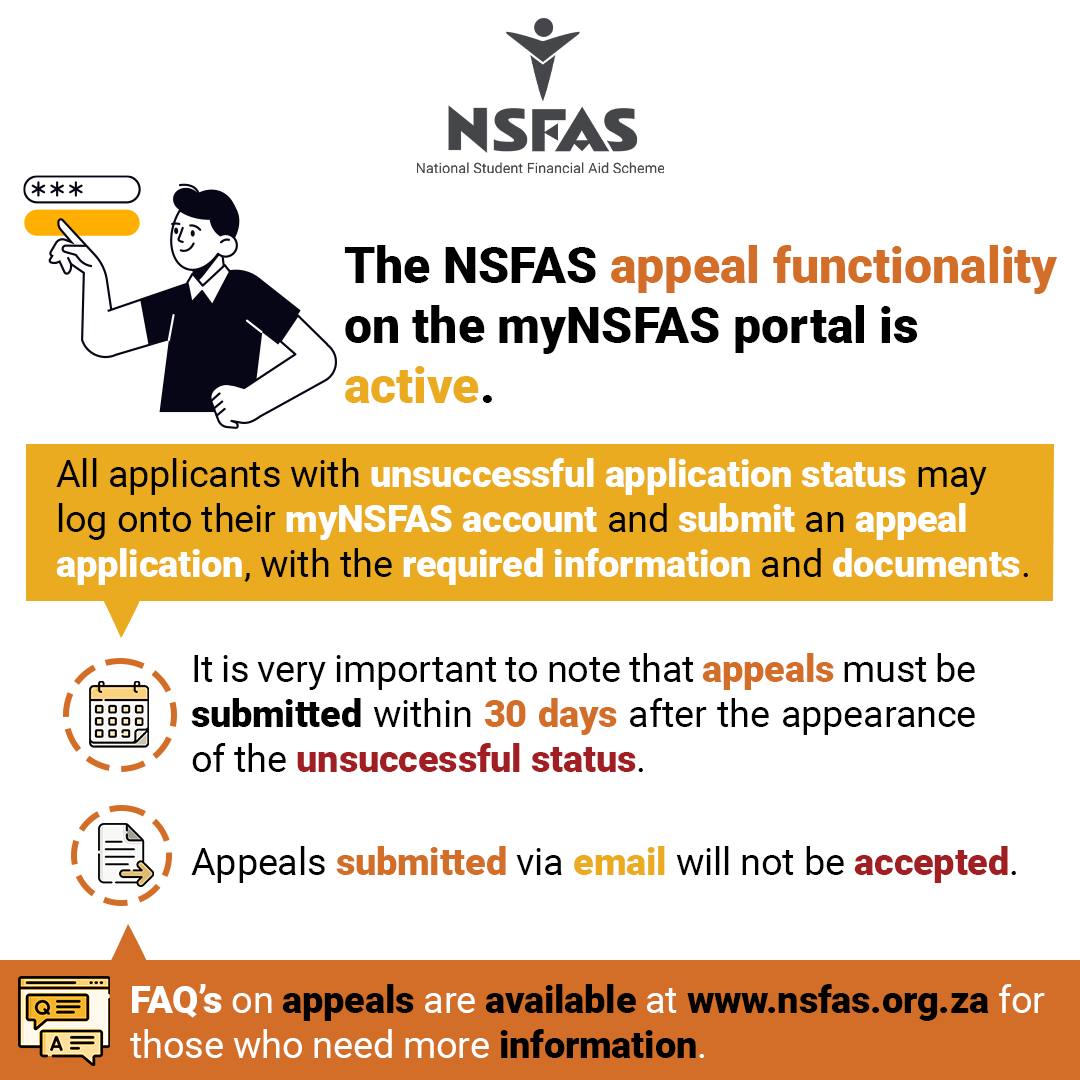
The National Student Financial Aid Scheme (NSFAS) plays a crucial role in providing financial assistance to students pursuing higher education in South Africa. If you have applied for financial aid through NSFAS for the 2023 academic year and received a rejection, there is still hope. In this comprehensive guide, we will walk you through the NSFAS appeal process step by step, ensuring that you understand the requirements and procedures involved.
What is an Appeal?
An appeal is a formal request made by an applicant to NSFAS, asking them to review a declined application for financial aid. It allows applicants to bring attention to potential errors in their application assessment and provide additional information or evidence that may support their eligibility for funding. It’s essential to note that you must submit your appeal within 30 days of receiving the declined application status.
Who is Eligible to Lodge an Appeal?
You may lodge an appeal with NSFAS if:
- Your application for financial aid has been rejected.
- The financial aid for a continuing student has been withdrawn.
However, it’s important to understand that the final decision on the outcome of the appeal will depend on NSFAS’s budget availability. Appeals will only be considered for those students who have applied to NSFAS for financial aid.
Who is Not Eligible to Lodge an Appeal?
You may not lodge an appeal if:
- You are engaging in a qualification that NSFAS does not fund.
- You have obtained an N+2 qualification (N+3 for students living with disabilities).
- You are in a gap year, and NSFAS previously denied your application due to not meeting the academic eligibility criteria.
- You are at an institution that has not submitted your registration record to NSFAS (in this case, you should contact your institution for queries).
- You are at an institution that has submitted incorrect registration records to NSFAS (in this case, you should contact your institution for queries).
Reasons for Lodging an Appeal
1. Exceeding the Income Threshold
If you exceed the income threshold, your appeal may be considered if:
- The financial circumstances of your household income have changed since you first submitted your application to NSFAS. In such cases, make sure to provide ample evidence of the changes when you lodge your appeal.
- The breadwinner of your household has become incapacitated or deceased since you submitted your application.
- You have been declared independent of your biological parents by the court, relieving them of responsibility for your application and maintenance. This should be supported by appropriate legal documentation.
- You are from a child-headed household, as evidenced by a report from the Department of Social Development issued by a registered social worker.
- Your parents are divorced, and according to the divorce decree, only one parent who meets the financial eligibility criteria is responsible for child maintenance, including the cost of your education.
2. Failing to Meet the Academic Eligibility
If you failed to meet the academic eligibility criteria, your appeal may be considered if:
- You are a continuing student who was not a full-time or full-time equivalent (FTN/FTEN) student in your previous academic term and failed to complete the term due to a severe illness lasting more than two months or examinations.
- You have experienced the death of an immediate family member during your academic term.
- You have been a victim of a violent crime, such as rape or abuse.
- You have fallen pregnant and given birth during your academic term, and your institution has evaluated you and completed the NSFAS standard propensity letter, confirming that you will complete your qualification within an additional academic term.
- You are living with a disability and have a medical report proving that you were unable to complete your academic term due to the nature of your disability. Your institution must also evaluate you and complete the NSFAS standard propensity letter, ensuring that you will complete your relevant qualification in an additional academic term.
- You can provide evidence that the academic results received by NSFAS were incorrect.
How to Submit an Appeal
- Login to your MyNSFAS account.
- Click on the ‘Track Funding Progress’ portal.
- Navigate to the application progress tabs.
- If you receive an unsuccessful message for your application status, click the ‘Submit Appeal Tab’.
- On the ‘Application Appeal’ page, you will be provided with a reason for your unsuccessful application status.
- Choose the appeal reason that corresponds to your situation.
- Upload certified supporting documents that provide evidence to support your appeal.
- Click on ‘Submit Appeal’.
- You will be able to track the progress of your appeal on your myNSFAS account.
Please note that if you wish to lodge an appeal, you will also be required to download and complete a relevant propensity letter. For any queries or assistance, you can contact NSFAS through the following channels:
- Call: 080 006 7327 (toll-free number)
- Email: [email protected]
Remember, the appeal process is your opportunity to present a compelling case to NSFAS and demonstrate your eligibility for financial aid. Make sure to provide accurate and comprehensive information, along with the necessary supporting documents, to increase your chances of a successful appeal.
Was this helpful?
1 / 1
#Bursaries #Education #National Student Financial Aid Scheme (NSFAS) #News & Updates